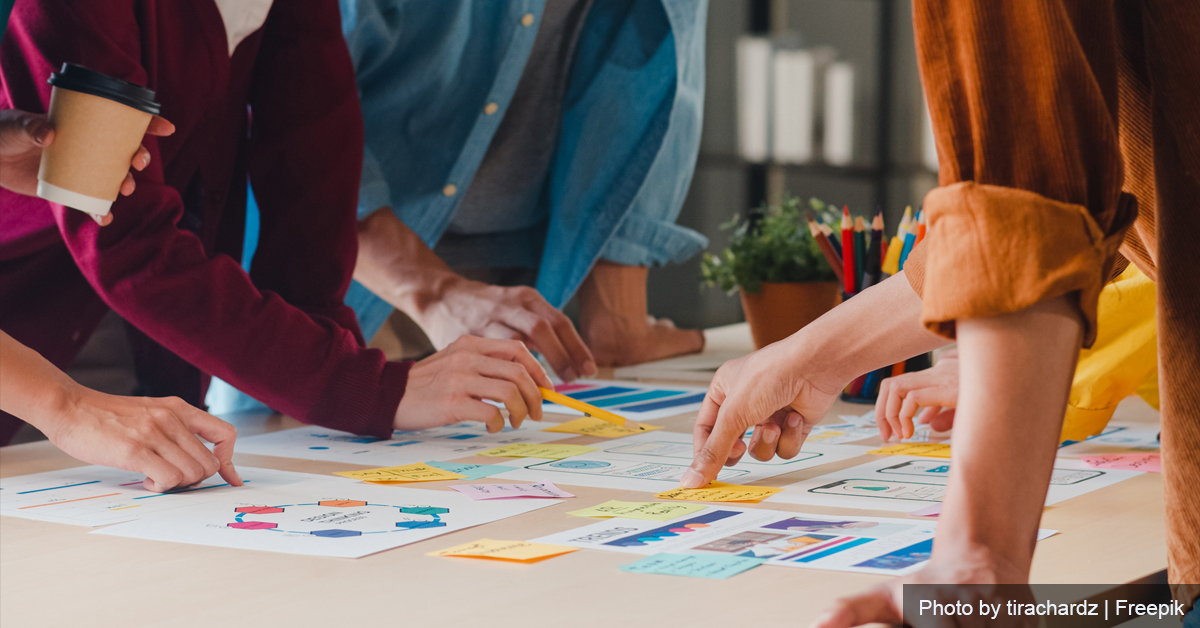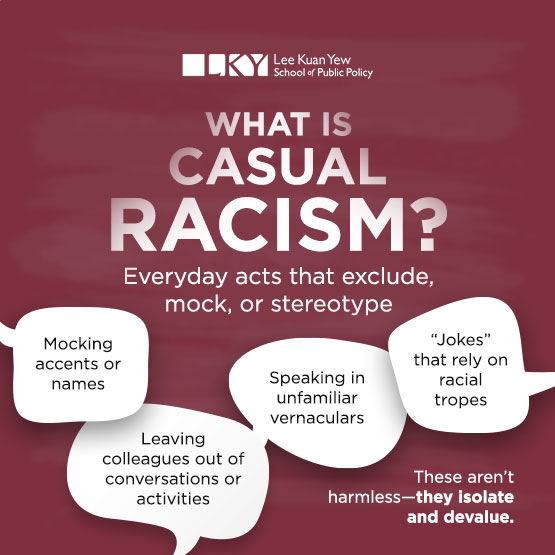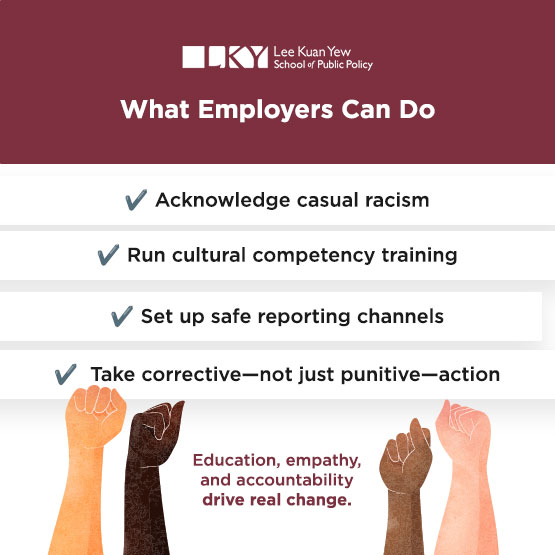
Diversity is both our heritage and strength in multicultural Singapore.
Yet, while we pride ourselves on our ability to foster harmony amid adversity, instances of discrimination and racial insensitivity are bound to surface.
Earlier this month, Home Affairs and Law Minister K Shanmugam delivered a statement in parliament in relation to the late Sergeant Uvaraja Gopal's allegations of racial discrimination and workplace bullying in the Singapore Police Force (SPF). Investigations established the use of racially inappropriate language, which was addressed promptly at its occurrence.
Mr Shanmugam also said that the SPF will investigate all claims of casual racism among its ranks as possible misconduct warranting disciplinary action.
The decision to address undercurrents of racial issues at workplaces is a much needed one. There is nothing casual about casual racism.
A 2022 Institute of Policy Studies (IPS) report on race relations, which surveyed more than 2,000 Singapore residents, found that about one-fifth of minority-race respondents reported experiencing unfair treatment at work due to their race.
While the study did not delve into the forms of unfair treatment respondents experienced - which could have ranged from minor infractions to blatant discrimination - this underscores the value of a more proactive approach to addressing issues of racism.
FLYING UNDER THE RADAR
Casual racism, or everyday racism, encompasses a wide range of behaviours that subtly or overtly convey negative racial stereotypes or prejudices. They can occur in daily interactions and include actions that may seem benign or unintentional but result in excluding or marginalising individuals.

Casual racism could include carrying out conversations in a vernacular unfamiliar to some individuals in the group, inadvertently alienating them. It can also include mocking or mimicking someone's non-native language skills or accent.
The impact of casual racism in Singapore is potentially underestimated for several reasons.
First, casual racism is cloaked under the guise of humour, ignorance, or the mundane interactions of daily life. It does not always carry the malice found in more blatant forms of racism. Some might even question whether casual racism truly constitutes an issue. This can make it difficult for individuals and organisations to identify and address it.
Second, conformity and conflict avoidance are deeply ingrained in Singapore's societal fabric. These values help sustain the peaceful co-existence of different cultures in a dense city, but makes acknowledging casual racism uncomfortable. Seemingly minor remarks or actions may be brushed aside, rationalised or ignored altogether to avoid rocking the boat, or for fear of being perceived as disruptive or overly sensitive.
Third, personal experiences shape perceptions. Individuals who find themselves on the receiving end of casual racism less frequently may struggle to grasp its impact or empathise with others less fortunate. This disparity can result in underestimating the gravity of such acts.
IMPLICATIONS OF CASUAL RACISM
The impact of casual racism should not be underestimated. A 2023 US study noted how discriminatory experiences can produce negative psychological effects, such as heightened stress and anxiety, and lower self-worth.
Casual racism can undermine trust among individuals and erode the sense of belonging within groups, such as at the workplace. Mentorship and networking opportunities that play a crucial role in career progression can also be skewed by casual racism, leaving minority employees at a disadvantage.
For instance, supervisors with unconscious biases may operate with the belief that minorities may not "fit" into higher roles or the corporate culture, and so hesitate to mentor or advance minority subordinates.
Excluding minority employees from networking and after-work social events, under the guise of restrictive dietary preferences, is another deeply exclusionary practice. Beyond skipping a meal, this practice denies them opportunities for professional growth and building connections.
When individuals who face casual racism attempt to address the issue, they can face significant obstacles. This is especially so if the perpetrators hold positions of authority within the organisation. Concerns about professional repercussions can also deter individuals from speaking out.
In institutional settings lacking a supportive network, individuals confronting casual racism may feel isolated and overwhelmed.
SHARPENING OUR STANCE AGAINST CASUAL RACISM
Cultural shifts across the decades have deepened our understanding of what is considered racist. Behaviours that were once deemed as merely distasteful are now recognised as significantly more insidious.
Against this backdrop, it is no longer enough to assume that awareness alone will render one "less racist" or less prone to acts of casual racism. After all, individuals may have biases and habits that perpetuate their prejudice.
First, there is a need to reject bad behaviour in everyday settings actively. Given that many spend a significant portion of their waking hours at work, employers play a crucial role in rebuffing casual racism.

This starts with acknowledging that seemingly innocuous acts or comments should not be dismissed as harmless. Cultural competency training programmes can help sensitise employees to the perspectives of others and equip them with the skills to navigate a diverse workplace respectfully.
Establishing clear channels for reporting and addressing grievances, in tandem with the existing Tripartite Alliance for Fair and Progressive Employment Practices (TAFEP) framework, is another important step in creating discrimination-free environments.
Second, it is essential to implement corrective actions for those who perpetrate casual racism.
These must go beyond punitive measures, focusing instead on education, awareness, and the opportunity for personal growth and understanding. By engaging individuals in dialogue over and above mere sanctions, we can challenge and change the underlying attitudes and assumptions that fuel casual racism.
Prime Minister Lee Hsien Loong stated in his 2021 National Day Rally speech that a new Maintenance of Racial Harmony Act is in the works to consolidate the government's powers to deal with racial issues. That Singapore is considering such legislation signals the overriding importance of racial harmony to the country.
Sharpening our stance against casual racism is not only a moral obligation, but will advance the strategic imperative of fostering inclusivity and societal harmony.
Let us all play our part in ensuring that Singapore is a city where diversity is not just tolerated, but embraced and celebrated.
--
Mathew Mathews is Head of the Social Lab and Principal Research Fellow at the Institute of Policy Studies, National University of Singapore. He oversees a programme on Race, Religion, and Intergroup Cohesion (RRIC), which offers workshops for skills development to manage differences amid diversity. Melvin Tay is Research Associate at the same Institute.
This piece was first published in CNA on 22 February 2024.
Top photo from Freepik.